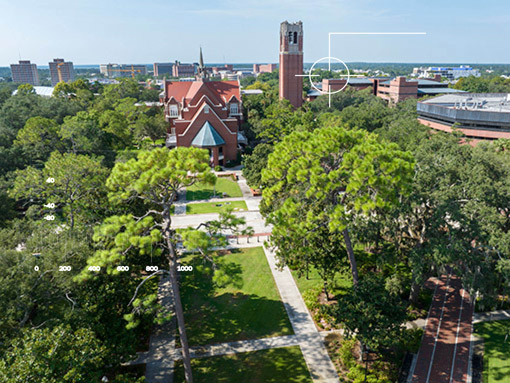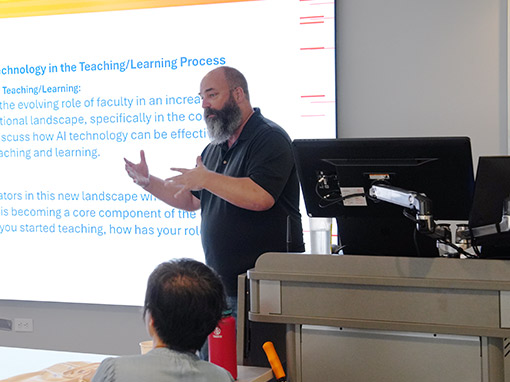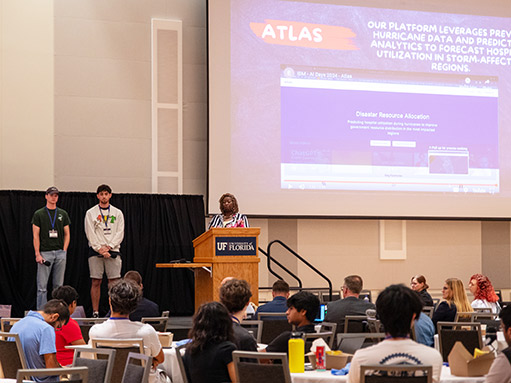Fully Engaged with AI
At UF, AI is taught across the full breadth of the university. All 16 colleges offer AI courses, and we add more every semester. AI is a leading driver of our teaching and research in technical, practical, scholarly, and artistic fields.
We set the standard for an AI university. On the one hand, we prepare AI-capable students in every discipline for the modern workforce. At the same time, we fuel life-changing discoveries by research faculty in every college. And every effort is grounded in ethics.
12k
Students annually
UF enrollment in AI courses
268+
AI-related internships
Via the Career Connection Center
300+
AI-focused faculty
Throughout the university
AI Expertise for All
UF is building a comprehensive, inclusive model to deliver AI education and training at every level.
As the state’s premier land-grant institution, we have hundreds of faculty members using AI—and educating others in how to do so. Our goal is to deliver AI education and training at every level. We engage with the teachers of K-20 students with our AI Learning Academy, where participants can earn a micro-credential if completing certain workshops. For upskilling for working professionals, we offer a micro-credential in artificial intelligence.
Centralized Leadership Is Key
In 2021, UF developed a five-year Quality Enhancement Plan to provide all students with the opportunity to acquire knowledge and skills in AI.
In 2022, the university centralized leadership of AI academic efforts through the Artificial Intelligence Academic Initiative (AI²) Center. This means that we approach AI with a broad view and a drive to spread expertise into every field.
What Is AI?
AI is a computer program or a machine’s ability to take action without being explicitly directed to do so. The growing AI field focuses on developing systems to perform tasks that would take humans an long, often unrealistic, amount of time to complete.
One of the hallmarks of AI is its ability to compile data and detect pattens. This means AI can do many things including image generation, translation, speech recognition, agricultural predictions, medical research, loan processing, and more. Here are the most common classifications of AI.
Generative AI allows users to generate new content based on information prompts including sounds, images, text, 3D models, and more. Generative AI provides the ability to use varied learning approaches. This is the most commonly known type of AI and can be accessed through sources such as ChatGPT.
Large language models (LLMs) are algorithms that can process and predict content and generate content from large amounts of data. This is also known as “deep learning.” LLMs can emulate natural human patterns of communication in context.
Digital twins are virtual versions of physical things and/or processes. Digital twins are highly useful in scientific fields where prediction is high stakes, such as the simulators used on Earth during the Apollo 13 mission. They pre-date AI, but AI brings added power to this digital twins in medicine, the built environment, and other fields.
Machine learning (ML) uses algorithms and mathematical models to find patterns in large amounts of data. It then applies its learning to predictions and reports.
AI Ethics
UF is committed to an ethical and equitable approach to artificial intelligence in its teaching, research and business practices. The university requires an ethics course (Ethics, Data, and Technology) in all certificates and majors related to AI and data science.
The AI² Center
What happens here? Everything about the evolving work of teaching and learning AI across the university and education. AI-engaged faculty from any college or university work on expanding curriculum and teaching practices. Our student club draws more than 200 UF students to work on AI projects.
Explore the CenterAI Blue Sky Task Force
AI at UF continues to evolve. The university wide UF AI Blue Sky Task Force released a report in the spring of 2025 with a series of recommendations for how the university can lead AI-driven higher education in the next five years. Read the executive summary and full report.
Cup o’ Joe: Blue Sky
Professors Jane Southworth and Kati Magliaccio, who chaired the AI Blue Sky Task Force, sit down with Interim Provost Joe Glover to share the big picture thinking that animated the AI Blue Sky Task Force's discussions.
Got a Minute?
UF’s AI Minute podcast has ideas for you.





